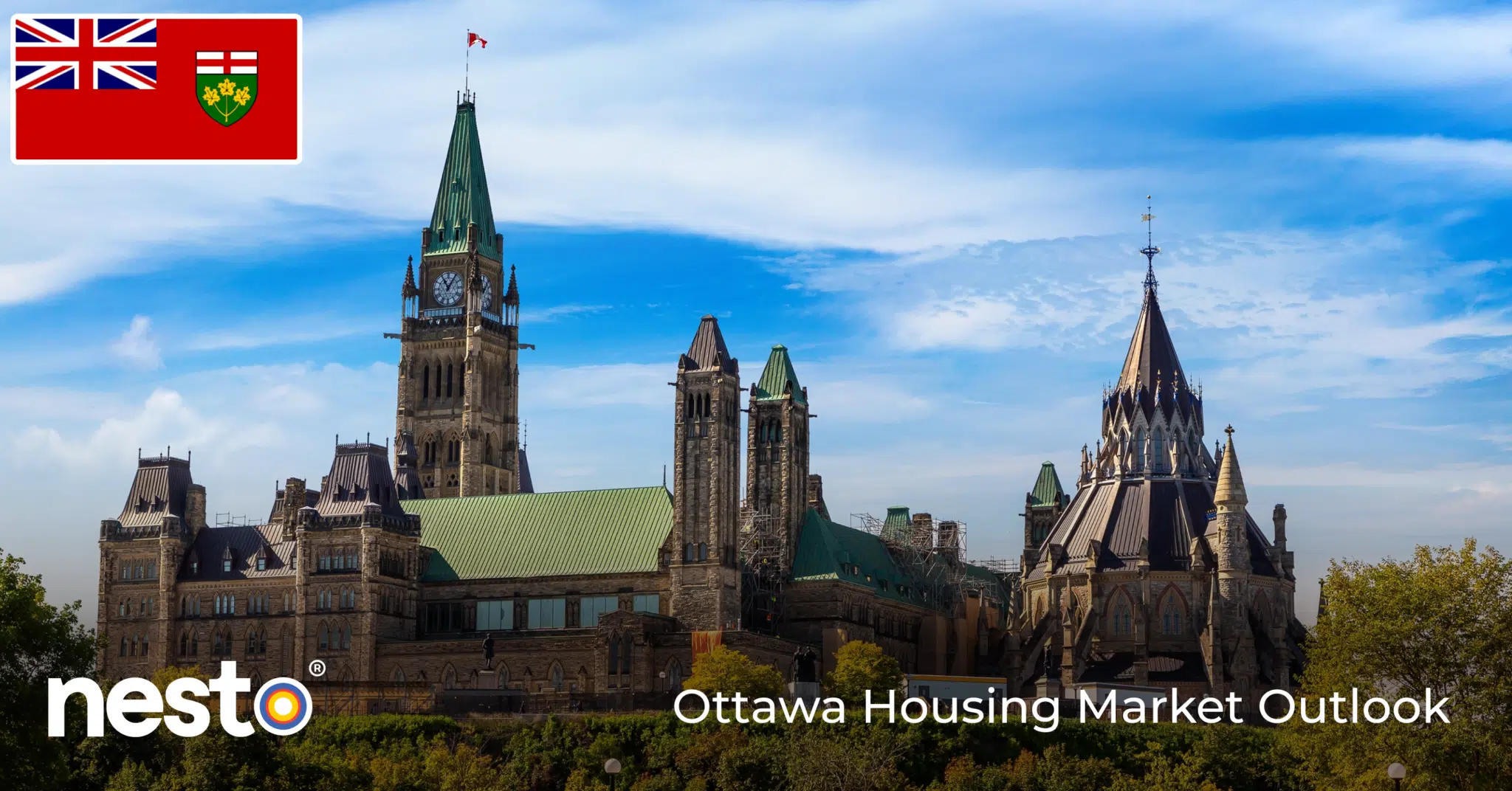Ottawa Housing Market Outlook 2025

Table of contents
Ottawa Market Report Summary
- The average selling price of a home in Ottawa increased by 0.8% year-over-year to $629,800 in May 2025.
- The average selling price of a single-family home in Ottawa increased by 0.6% year-over-year to $700,000 in May 2025.
- The average selling price of a townhouse/multiplex in Ottawa increased by 3.4% year-over-year to $446,900 in May 2025.
- The average selling price of a condo in Ottawa decreased by 3.6% year-over-year to $404,700 in May 2025.
- The average rent in Ottawa unchanged by 0.0% year-over-year to $2,239 for May 2025.
- July 12, 2025: Today’s lowest mortgage rate in Ottawa is
for a 5-year fixed.
Composite Home Prices
![]()
The average selling price of a home in Ottawa was $629,800 for the month of May 2025, that’s decreased by 0.2% compared to the previous month. On a year-over-year basis, Ottawa home prices have increased 0.8% over the last 12 months.
Single-family Home Prices
![]()
The average selling price of a single-family home in Ottawa was $700,000 for the month of May 2025, that’s decreased by 0.5% compared to the previous month. On a year-over-year basis, single-family home prices in Ottawa have increased by 0.6% over the last 12 months.
Townhouse and Multiplex Prices
![]()
The average selling price of a townhouse in Ottawa was $446,900 for the month of May 2025, that’s increased by 1.6% compared to the previous month. On a year-over-year basis, the price of a townhouse in Ottawa has increased by 3.4% over the last 12 months.
Condo Prices
![]()
The average selling price of a condo in Ottawa was $404,700 for the month of May 2025, that’s increased by 0.2% compared to the previous month. On a year-over-year basis, the price of a condo in Ottawa has decreased 3.6% over the last 12 months.
We’re curious…
Ottawa Housing Market Summary
Data from the Ottawa Real Estate Board (OREB) indicates that the average price of resale residential homes sold across Ottawa in May 2025 was $629,800, and it increased of 0.8% compared to a year ago.
OREB also reported a sales-to-new-listings ratio (SNLR) of 53%, indicating a balanced market in Ottawa for May 2025.
Confidence Returns to Ottawa Real Estate as Delayed Spring Boosts Sales and Listings
Ottawa’s housing market saw a sharp seasonal rebound in May 2025, with signs that buyer confidence is gaining momentum after a sluggish start to the year. According to the Ottawa Real Estate Board (OREB), 1,807 homes were sold through the Multiple Listing Service (MLS) in May, representing a 33.1% increase from April and a 14.9% year-over-year increase. This monthly jump aligns with what OREB President Paul Czan describes as a “delayed spring market,” largely attributed to consumer hesitation during the federal election in April.
Home Sales Rebound but Market Remains Balanced
While sales activity surged month-over-month, the broader market remains stable and well-balanced. The 1,807 transactions in May were just 2.5% above the five-year average, suggesting Ottawa isn’t overheating despite the jump in activity. Year-to-date, sales are essentially flat compared to the same period in 2024.
● May 2025 sales: 1,807 units (+14.9% YoY)
● Average sale price: $728,623 (+4.8% YoY)
● Benchmark composite price: $629,800 (+0.8% YoY)
● New listings: 3,430 (+8.7% YoY)
● Active listings: 4,347 (+13.5% YoY)
● Months of inventory: 2.4 (unchanged YoY)
Region Remains Stable as Home Prices Edge Higher
Ottawa’s benchmark price for all home types rose slightly year-over-year, led by more substantial gains in townhomes and single-family properties. The average home price hit $728,623, a 4.8% increase from last May, while the median price climbed 4.2% to $674,800. Single-family homes saw benchmark growth of 0.6% to $700,000, townhouses rose 3.4% to $446,900, while apartment prices slipped 3.6% to $404,700.
Despite these increases, most homes are still selling very close to the list price, with the sale-to-list price ratio remaining steady at 98.8%. Median days on market remained low at 17, reflecting steady buyer demand without frenzied competition.
Inventory and Listings Continue to Climb
Sellers are returning to the market, encouraged by renewed buyer interest. New listings in May reached 3,430, up nearly 9% from last year and 15.8% above the five-year average. Active listings increased to 4,347 units, 54% higher than the five-year average. However, the months of inventory remained stable at 2.4, firmly within balanced territory, suggesting that the supply-demand ratio hasn’t shifted enough to push prices dramatically in either direction.
Townhouses and Condos Sales Diverge
The townhouse segment saw the strongest performance in May. Sales rose 30.4% year-over-year, while listings grew 31.3%. Despite the uptick in supply, strong demand helped maintain balance, with MOI at 1.8 and prices relatively flat. Meanwhile, the condo market continued to struggle. Sales fell 20.3%, listings declined, and inventory rose to 4 months, indicating a clear imbalance between supply and demand. Prices in this segment were mixed, with the average condo selling for $492,359, a 5.4% increase, despite benchmark values falling 3.6%.
Stability Sets Ottawa Apart from Other Major Cities
Compared to Toronto and Vancouver, where stagnant sales and sharp increases in listings have created buyer’s markets, Ottawa remains more balanced. Sale prices are holding steady near listing prices, and activity levels remain robust. According to OREB President Paul Czan, “Buyers and sellers are still able to transact fairly, even amid broader economic uncertainty.”
Impact on Mortgages and Monetary Policy
Ottawa’s steady market conditions offer an interesting contrast to the price declines and inventory gluts seen in larger Canadian cities. This balance could signal to the Bank of Canada that housing activity in mid-sized markets, such as Ottawa, remains responsive to modest policy signals. A stable MOI, modest price growth, and consistent buyer activity all indicate that underlying demand is holding up. For homebuyers in Ottawa, it means less competition without the risk of sudden price spikes. Renewers in Ottawa benefit from rising equity and more predictable values, while refinancers may find it easier to qualify under current market conditions if borrowing costs begin to fall in the second half of 2025.
Month-over-Month Market Expectations for Ottawa
Transactions – Number of Sales
![]()
The number of sales in Ottawa was 1,807 during May 2025, that’s increased by 38.4% compared to the previous month. On a year-over-year basis, sales in Ottawa have increased by 17.0% over the last 12 months.
New Listings
![]()
The number of new listings in Ottawa was 3,430 during May 2025, that’s increased by 32.5% compared to the previous month. On a year-over-year basis, new listings in Ottawa have increased by 13.1% over the last 12 months.
Real Estate Market
![]()
The sales to new listings ratio (SNLR) in Ottawa was 53% during May 2025, indicating a balanced market. On a monthly basis, that’s increased by 4.4% compared to the previous month. Ottawa’s yearly sales to new listings ratio has increased by 3.5% over the last 12 months.
The sales to new listings ratio (SNLR) measures the number of home sales compared to new listings. An SNLR under 40% suggests a buyer’s market in which buyers have the upper hand and more negotiating power. An SNLR between 40% and 60% is a balanced market, while an SNLR of over 60% is considered a seller’s market.
Annual Changes to Composite Home Prices in Ottawa
We’re curious…
Ottawa Market Rents Summary
The average rent in Ottawa was $2,239 for the month of May 2025, which unchanged by 0.0% on a year-over-year basis.
The average rent for a bachelor apartment in Ottawa was $0 for the month of May 2025, which 0 by 0% on a year-over-year basis.
The average rent for a 1-bedroom apartment in Ottawa was $1,994 for the month of May 2025, which unchanged by 0.0% on a year-over-year basis.
The average rent for a 2-bedroom apartment in Ottawa was $2,559 for the month of May 2025, which increased by 2.0% on a year-over-year basis.
The average rent for a 3-bedroom apartment in Ottawa was $1,994 for the month of May 2025, which increased by 2.0% on a year-over-year basis.
How Does Renting Compare with Homeownership in Ottawa?
Each $100,000 in mortgage balance costs an average of $521.15 per month on nesto’s lowest fixed 5-year rate at
Rates used for calculation are those offered on insured purchases with less than a 20% downpayment on a 25-year amortization. Canada’s policy rate is 2.75%, and nesto’s prime rate is set to 4.95%.
Rental Price Changes by City
Rental Price Changes by Province
Rental Price Growth by Housing Type
We’re curious…
Frequently Asked Questions on Ottawa Housing Market Outlook for 2025
Will Ottawa home prices increase in 2025?
Home prices in Ottawa are expected to rise moderately in 2025 due to strong demand and limited housing supply. As the capital city, Ottawa remains a desirable location for families and professionals, which will sustain price growth.
Is Ottawa a good market for homebuyers in 2025?
Housing in Ottawa offers stability and strong long-term investment potential. Its relatively affordable pricing compared to Toronto, combined with high demand for family homes, makes it an appealing choice for buyers.
How will mortgage rates affect Ottawa’s housing market in 2025?
Declining mortgage rates will encourage more buyers to enter Ottawa’s housing market, increasing competition, particularly for single-family homes and townhouses.
What will drive housing trends in Ottawa in 2025?
Key drivers include strong employment growth in the public sector, limited inventory, and demand for suburban and multi-family housing options.
Will Ottawa’s housing prices remain competitive with other cities?
Ottawa’s home prices remain more affordable than those of Toronto and Vancouver, offering buyers better value while still being competitive in the national market.
Why Choose nesto
At nesto, our commission-free mortgage experts, certified in multiple provinces, provide exceptional advice and service that exceeds industry standards. Our mortgage experts are non-commissioned, salaried employees who provide impartial guidance on mortgage options tailored to your needs and are evaluated based on client satisfaction and advice quality. nesto aims to transform the mortgage industry by providing honest advice and competitive rates using a 100% fully digital, transparent, seamless process.
nesto is on a mission to offer a positive, empowering and transparent property financing experience – simplified from start to finish.
Contact our licensed and knowledgeable mortgage experts to find your best mortgage rate in Canada.
Ready to get started?
In just a few clicks, you can see our current rates. Then apply for your mortgage online in minutes!















